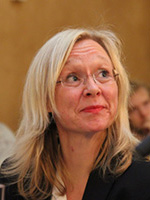
The whale and the parliament
The article "Assembling the Whale: Parliaments in the Politics of Nature" analyzes a major scientific and political controversy over whaling in Norway during the years 1875-1900, and more specifically how this issue was handled by the Norwegian parliament (the "Storting").
In doing so, the article is also part of the larger book project Kristin and Bård is pursuing, which is a core part of the Little Tools project. The book's working title is "Parliamentary Practices and the Nature of Constitutional Power: The whale and the legislator". The book is under contract with Routledge and planned for publication in 2017.
Article abstract
In the field of science and technology studies (STS), much research has been concerned with politics. Nevertheless STS research tends to disregard the work of conventional political institutions such as parliaments, especially in the politics of nature, which is often seen as delegating ‘nature’ to science. Parliaments work on nature-objects through documents; paperwork is crucial in its procedures for delegating an issue to be further worked upon at other sites, for securing the issue's return and for enabling a decision.

This mode of circulating an issue amounts to a central infrastructure for taking nature into account in politics; this infrastructure enables ‘assembling work’ as a specific mode of parliamentary practice. In the late nineteenth century the Norwegian parliament handled a controversy over whaling. New species, questions and publics were entangled with the whale issue through the parliament's work, its tools and procedures. As such, parliament enabled, worked upon and modified the issue. By assembling the whale issue it performed a politics of nature in rich, complex ways. Hence, understanding the specific site where an issue is taken up is necessary in order to grasp its trajectory and to understand how conventional political sites do politics of nature in practice.
Full reference
Kristin Asdal & Bård Hobæk 2016. "Assembling the Whale: Parliaments in the Politics of Nature." Science as Culture, 25 (1): 96-116. (Download PDF)
The article is published in the newest edition of the journal Science as Culture, one of the central journals within the field of Science and Technology Studies (STS). The article is part of a special issue titled "Infrastructuring Environments", edited by Anders Blok, Moe Nakazora & Brit Ross Winthereik. Link to online edition here.